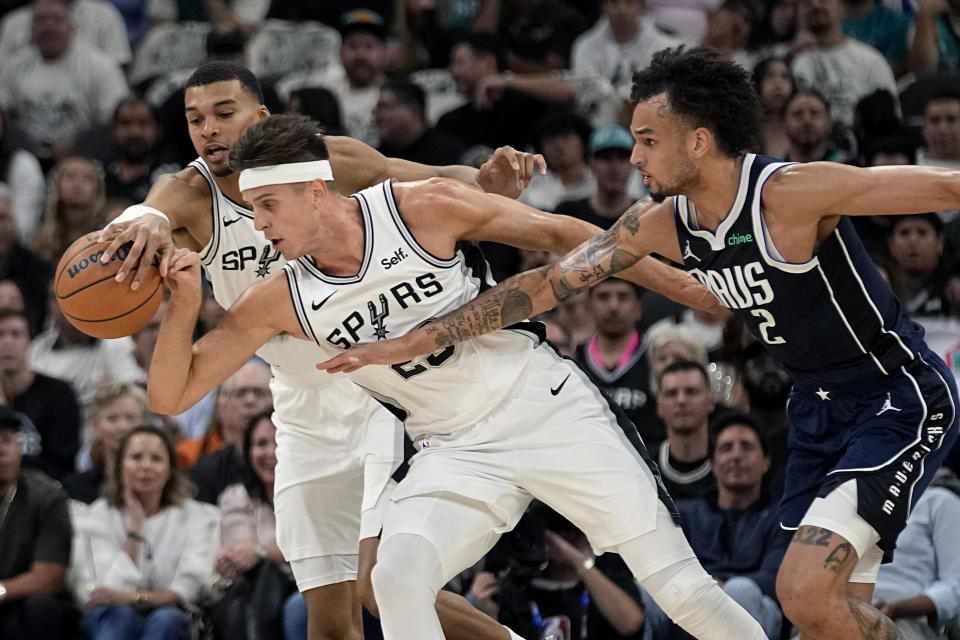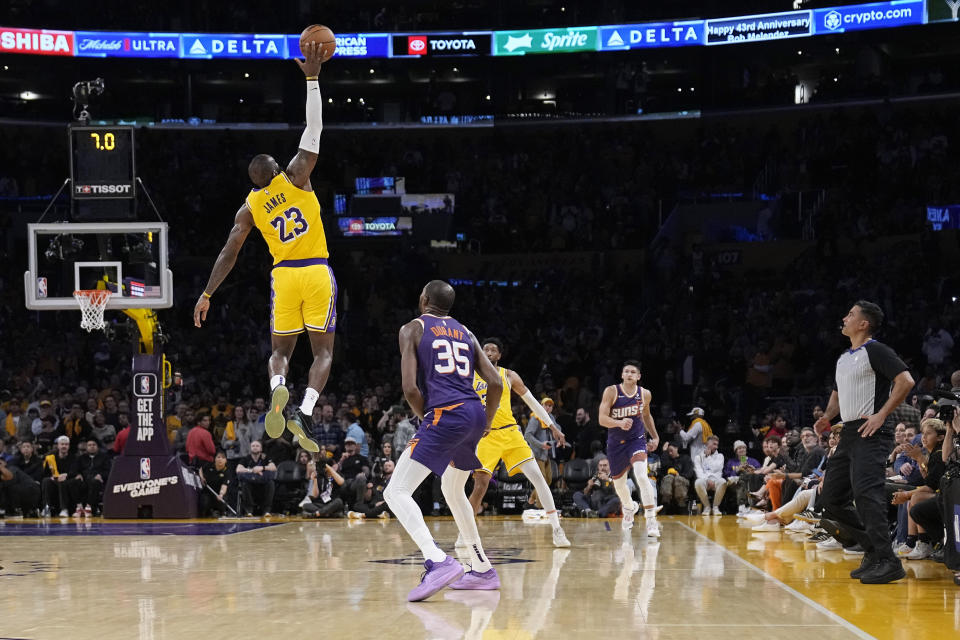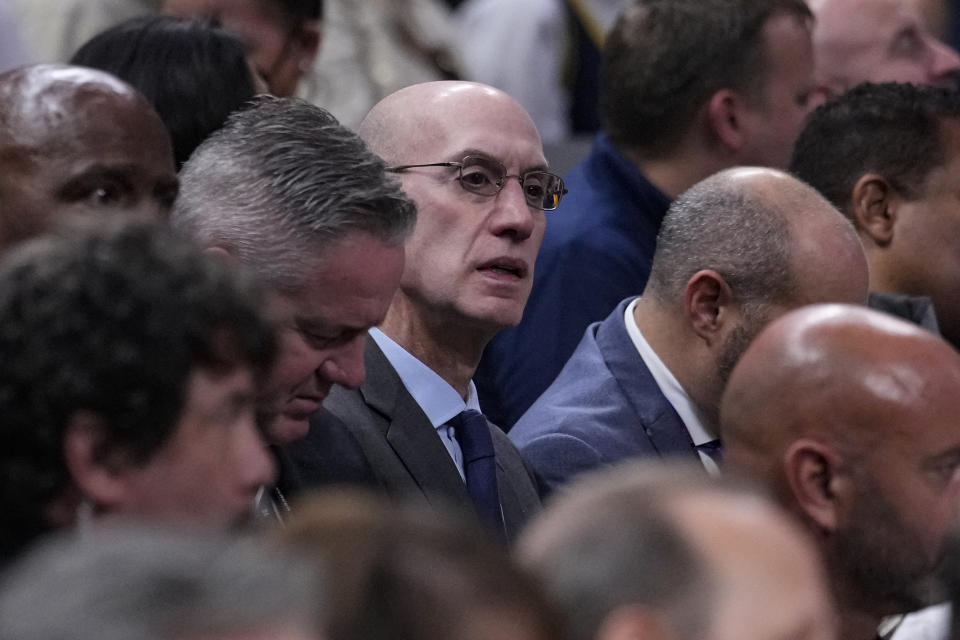Next NBA media rights deal already subject of speculation before negotiations even start
The NBA will have its own version of March Madness this season.
It won't take place on the court or feature a matchup between LeBron James and Joel Embiid. Instead, it will set the framework for how fans will be able to watch their favorite teams and players in future seasons.
“There’s certain structural changes we want to make in sort of how our television relationship works, but at the same time, we’re not quite sure how it’s going to look,” NBA Commissioner Adam Silver said after a Board of Governors meeting earlier this year. “You’re clearly seeing an evolution or a morphing of media moving continually to streaming services. ... Obviously other entrants in the market would potentially be interested.”
The league's 45-day negotiation period with the incumbents, ESPN/ABC and TNT, for the next media rights deal formally begins March 9. Both sides have had conversations about renewing their deals, but not nearly at the same level as 2014, when ESPN and ABC approached the NBA two years early about renewing.
The league's nine-year agreement, which runs through the 2024-25 season, brings in an average of $2.67 billion per season, making it the world's second-richest deal for domestic rights. That is nearly triple the $930 million per year from the previous eight-year contract.
ESPN and Turner ponied up large amounts of money to make sure its competitors didn't have a chance to grab a piece of the market. With streaming services already part of baseball, NFL and NHL deals and long-term questions about the viability of ESPN and Turner in a shifting media marketplace, there will be the addition of at least one more outlet in a future deal.
“There are several potential candidates to have a package of NBA content. The question is, what is the number that the NBA is looking for and can they get that price from the others?” said Tag Garson, Wasserman’s senior vice president of properties.
ESPN/ABC and Turner air a combined 165 regular-season games. Warner Brothers Discovery, which owns Turner Sports, also runs NBA TV, which airs 106 games.
It would not be surprising to see ESPN and Turner reduce their regular-season inventory, as long as they both had priority during the playoffs.
Burke Magnus, ESPN's president of content, has said in multiple interviews that maintaining the NBA Finals remains a priority.
The NBA also remains appointment viewing. The six games on ESPN and Turner from Tuesday through Thursday averaged 2.57 million viewers, up 13% over last season and the most-viewed opening week in the six years that the season opened on schedule.
ESPN's Wednesday night doubleheader, which included Victor Wembanyama's debut with the San Antonio Spurs, averaged 2.76 million viewers, the network's second-most watched opening night in 20 years.
Getting a better gauge of ESPN's financial outlook will be easier beginning next month, when its earnings will be broken out quarterly as part of Walt Disney Company's reorganization. In a Securities and Exchange Commission filing from last week, ESPN had revenues of $13.2 billion and a $1.5 billion profit through the first nine months of the 2023 fiscal year.
ESPN has also discussed adding strategic partners, which could include sports leagues, as it prepares to launch a direct-to-consumer product by 2025.
The future of Turner also remains an unknown. In the past nine years, it has been part of Time Warner, AT&T, WarnerMedia and now Warner Brothers Discovery.
The NBA will have a streaming company involved in its next deal, with plenty of suitors interested. Amazon would like to create a package similar to “Thursday Night Football,” but Peacock also has interest as a way for NBC to get back in with the NBA. NBC aired games from 1990 through 2002 and John Tesh's “Roundball Rock” theme song remains one of basketball's unofficial anthems.
Whether a Peacock deal would also include games on NBC and/or USA Network is also a question.
Apple also expressed interest since the league's global rights also expire at the same time. Apple's deal with Major League Baseball involves multiple countries and it has a worldwide agreement with Major League Soccer.
National deals are only part of the equation, though. The “League Pass” package of out-of-market games could go to a streaming company for the right value. That was part of ESPN's agreement with the National Hockey League in 2021, when it got the out-of-market games for its ESPN+ streaming service.
The league also remains involved in discussions with Diamond Sports Group, which holds the local rights for 15 franchises. Diamond has been in bankruptcy court since March, but the league and the regional sports network operator are trying to find common ground on rights fees, which might include reductions for some teams. Unlike baseball, where the local agreements were separate, the NBA can negotiate all the deals.
A reduction in fees also might be a better avenue than nothing. The Arizona Diamondbacks and San Diego Padres' local games ended up being produced and distributed by Major League Baseball after Diamond could not reach a resolution with the teams about reducing fees.
___
AP NBA: https://apnews.com/hub/nba

 Yahoo News
Yahoo News 


